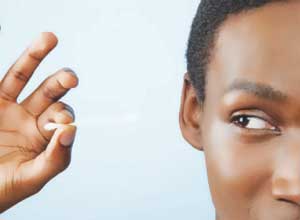Almost everybody engages in cleaning of the ears with swabs, against the advice of the surgeon-general: if you must clean your ears, use your elbow. TEMITOPE OJO writes of the negative consequences of engaging in this act.
 We’ve all done it. You’ve done it a few times this week after shower, or probably are even in the act now. We’re talking about cleaning your ears with a cotton swab. You open up that medicine cabinet, reach for a fresh cotton swab and jam it into your ear to clean out the wax that has taken refuge in your ear canal over the past few days.
We’ve all done it. You’ve done it a few times this week after shower, or probably are even in the act now. We’re talking about cleaning your ears with a cotton swab. You open up that medicine cabinet, reach for a fresh cotton swab and jam it into your ear to clean out the wax that has taken refuge in your ear canal over the past few days.
Many people regularly clean their ears with the ‘best’ intentions of keeping them clean and healthy. However, ears are not designed for cleaning. In fact, they have their own hygienic regime in place, and by sticking objects into the ear, you are only disrupting this natural process.
Also, there are other negative consequences associated with this style of at-home ear cleaning. From super-impacted wax to punctured eardrums, there are quite a few reasons you should reconsider cleaning with a cotton swab.
Experts warn against the use of cotton-tipped applicators and the habit of probing into your ears. On their official website, they connect the over-zealous ear cleaning with the risk of hearing loss.
Ear wax, medically known as cerumen, is a healthy feature of the ears and acts as a self-cleaning agent and trap for insects. It has protective, lubricating and anti-bacterial characteristics. It migrates from the ear drum to the ear opening, cleaning the ear canal, and then drying and falling out. This is a self-regulating process and in normal circumstances, there is no need to interfere. If there is an absence of ear wax, the ears become dry and itchy.
When you use cotton swabs in your ears…
You could rupture your eardrum and cause permanent hearing loss. Because the eardrum is easily reached with a swab, it can be easily ruptured – even if you’re using gentle pressure to clean away debris. When this occurs, you’ll know it from an intense pain and because the eardrum may also leak a clear fluid.
The eardrum will eventually heal, but it may lead to something known in the otology field as “conductive hearing loss”. Basically, this means that you won’t be able to hear as well because sound conduction in the outer/and or middle ear is disrupted.
When you use cotton swabs, you are actually pushing the wax deeper into your ear, and into the area where it shouldn’t be. It can get stuck and block the ear drum, which can cause all sorts of complications.
Swabs also are notorious for merely pushing around earwax in the canal where it may cause pain, pressure or temporarily poor hearing on a more short-term basis.
Fungus, bacteria and viruses from the outer ear get pushed into the ear and can cause infections, which are extremely painful. Second, if the wax is jammed deep inside the ear canal, it can cause hearing loss. If it gets shoved even further, it can damage the ear drum and result in a rupture.
Should the ears be cleaned at all?
Ideally, your ears should never be cleaned. By cleaning the inside of the ear, you are only creating a vicious cycle. Experts explain that when you constantly rub the skin of your ears, a lot of histamine gets released. This makes the skin irritated and inflamed. And the more you scratch, the more it itches.
The only time that ear wax should be cleaned is when you’ve been assessed by a doctor, who has noticed cerumen impaction (wax accumulation). The condition presents with symptoms such as earache, hearing loss, tinnitus, itching, odour and discharge. The ear should then be cleaned by a medical professional.
If you want to continue cleaning your ears, do not insert anything into the inner ear! The only part of the ear that really should be cleaned is the part that can be seen when looking in a mirror, commonly known as the outer ear. This can be done with a little soap, water and a handy washcloth. In most individuals, the ear canal does not need to be cleaned.
In fact, during most showers, enough water enters the ear canal to dislodge the accumulated wax, so there is no extra work on your part. In addition, the skin in our ears grows outward in a spiral pattern (sounds gross, but it’s for a good reason) and it will eventually get to a point where the ear wax just falls off while you sleep.
But the bottom line is that you shouldn’t be putting anything into your ear. Just let the body do its magic!













